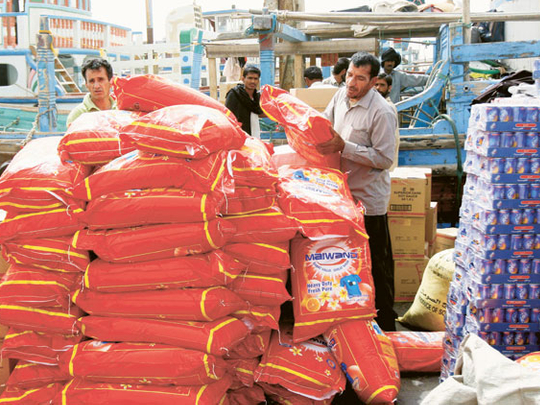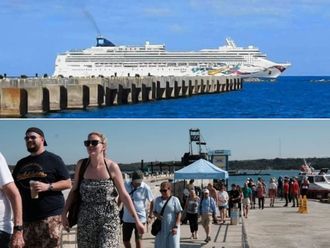
A walk along Dubai Creek's bustling wharf shows a side of this busy trading city that has endured for decades, but life for the Iranian traders who have long known it as a reliable port for their wooden boats is changing in light of tightening sanctions imposed by the United States and the European Union.
"While it took us a maximum of five days to load our dhows with goods, now we stay on the wharf for a month or two to get the loads on," said Majeed, an Iranian dhow crewman.
Majeed, 28, said that the situation has become progressively more difficult since he first started working on the Al Boom five years ago.
Iskander, the owner of the dhow, added that working the traditional trade route is becoming more costly as well. He is expected to pay a minimum of Dh220 in Dubai Municipality fees per day so that his boat can stay at the quayside, while other bigger vessels accrue charges of up to Dh4,000. With the delays of recent weeks, the fees have been crippling.
"With the depreciation of the rial, the demand for goods has fallen and shipments are declining," Iskander complained. "We used to have five shipments every two months, now we are lucky to get one."
Ships and dhows from the Gulf, Iran, the Indian subcontinent and even Europe have always called at Dubai, given its centuries-old position as a re-export hub for the region. Even today, ships laden with 200 to 300 tonnes of cargo anchor at Dubai Creek.
Iskander, who has been in the same business for over 30 years, is nostalgic about this historic stretch of quayside, describing how in the past there would be hundreds of the traditional wooden boats, some sitting low in the water, laden heavily with cargo.
Today, however, a good number of these cargo vessels have been forced to halt operations due to the latest sanctions on Iran. Boats of traders who have chosen to remain sit empty waiting for a full load while some parts of the wharf are piled high with everything from televisions and fridges to batteries and paint, toys, blankets, car tyres, shoes, food and even cars.
Majeed, who estimates that 90 per cent of the ships operating on the creek are Iranian-owned, blames the rial for the drop-off in trade. "As the currency difference is getting greater [customers] reduce the volume of goods they can buy. It is getting very expensive in Iran," he said. "We used to sell an air-conditioner for 8 million rials (Dh2,375), now it is sold for 15 million rials. All the prices have doubled."
"The sanctions imposed on Iran have affected our businesses as traders, but the effect is worse for normal Iranians," he added.
Rial plunge hits hard
Even the crewmen biding their time between loads have suffered, Majeed added. At one time the exchange rate was 250 rials to the UAE dirham, but now it is 55,000.
The UAE has also tightened customs inspections on goods destined for Iran, said Ali Bloush, a trader who plies the waters between Iran's Shahbahar and Dubai through the Strait of Hormuz,
"Customs authorities over the past few months have adopted a new system to check every shipment that passes via the UAE to Iran. Due to this, there are delays in the cargo shipments which add to the losses," Bloush said. "They even inspect the mattresses we sleep on."
Gulam Ali, who has worked on the dhow Ya Ali for over 40 years, spoke to Gulf News as his crew loaded crates of Pepsi and Perrier bound for Iran. He said that customs procedures have become even more stringent in recent weeks. "The inspections [are particularly] difficult for transit goods. We have to offload everything and they are opened and checked piece by piece," he said. "This might delay us by a full day."
Saeed, an Iranian crewman working on the dhow Tayb, said that new travel procedures require all crew to have an iris scan for every trip they make to the UAE. But one upside is that there is more space at the ports.
"Earlier we could hardly find a place to store our goods on the dock or parking space for trucks."











